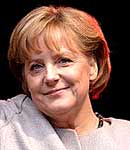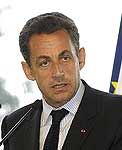|
 Taking a cue from chancellor Gordon Brown, European financial giants, France and Germany, followed by Spain and other European nations have launched a trillion dollar plus coordinated bank rescue plan which guarantee inter-bank lending, inject cash into the banking sector among other measures, which saw stock exchanges zoom around the globe after weeks of turmoil and bank failures threatened to take European countries to a definite recession. Taking a cue from chancellor Gordon Brown, European financial giants, France and Germany, followed by Spain and other European nations have launched a trillion dollar plus coordinated bank rescue plan which guarantee inter-bank lending, inject cash into the banking sector among other measures, which saw stock exchanges zoom around the globe after weeks of turmoil and bank failures threatened to take European countries to a definite recession.
The British bailout plan in synch with the European bailout package turned out to be the saviours of the markets after the $700-billion bailout plan failed to stop the carnage on global stock markets, which crashed further after the US Congress passed the package on 1 October. The emergency summit in Paris on Sunday night did the trick as leaders of the 15 nations that use the euro hammered out a unified and coordinated Europe-wide plan, which was announced late yesterday night. - The European powerhouse, Germany announced more than €400 billion in loan guarantees. In addition it will set aside €20 billion to cover potential losses and an additional €80 billion of fresh capital for its struggling banks, the cost of which will be borne by taxpayers. A special fund will be created for this, known as 'special financial stabilisation fund.'
 The plan allows preference shares, ordinary shares or hybrid capital or different instruments to be kept as collateral with the government to avail of capital, and an easing of the accounting rules so that banks can delay writing-off the value of an asset on its books as soon as it falls. The plan allows preference shares, ordinary shares or hybrid capital or different instruments to be kept as collateral with the government to avail of capital, and an easing of the accounting rules so that banks can delay writing-off the value of an asset on its books as soon as it falls.
The German government, which has been a hesitant partner in the European bailout scheme, was eventually persuaded by French President Sarkozy to throw its weight behind attempts to save distressed banks. Germany had always been in the forefront asking for more regulations in the global banking sector and now after announcing its package, will ask for more accountability from managers for company decisions and has vowed to tighten regulations. The package, which is line with other European nations, was approved by the German cabinet yesterday and Chancellor Angela Merkel said the rescue package would only work if it was followed up by stringent international regulation to bring an end to the "market excesses." She said these measures were the first element of a "new financial market charter, but it could only be worthy of the name if it is followed by a second element, namely a change in international rules." The German finance ministry said, unusual market conditions call for unusual measures. "It is not just about protecting banks and other financial institutions but also about protecting citizens, " it said. - Sarkozy unveiled the French bailout plan, which pumps nearly €40 billion into its banks and guarantees €320 billion in bank debt. This bailout will signify French government's largest national state loan and nationalisation scheme since 1982.
In a bid to nationalise companies on ideological grounds, former French President Francois Mitterrand had come out with a €39-billion French Franc plan, which became such a mess that the companies were privatised again. France will now establish a new company with six French banks as shareholders who will deal with bank liquidity and buy a range of credit or issue paper. As a beginning, it will first bail out Dexia SA by injecting €1 billion which the governments of France and Belgium had earlier agreed to. Speaking at a press conference at the Elysee Palace in Paris, Sarkozy said, ''The greatest risk is in inertia, the bank loan guarantee will represent €320 billion, this massive commitment is up to the challenge.'' Later on speaking on radio, he said ''Guarantees have been given, there is complete political determination, there is no reason today, for either depositors, market actors or businesses to have anything to fear.'' Spain guarantees €100 billion - The Spanish government said that it will guarantee as much as €100 billion in bank debt and was willing to set up a mechanism to inject fresh capital into its banks if required as according to its estimates none of them were in need of it.
- Italy also announced an unlimited plan to guarantee bank debt, but a finance ministry spokesperson said the government doesn't expect any banks to tap it in the near future.
- Austrian finance minister Wilhelm Molterer said yesterday that his government would provide up to €85 billion in guarantees and up to €15 billion in fresh equity to its banks.
- Portugal will extend a financing line worth 20 billion euros ($27.45 billion) to guarantee the liquidity of its banks while the Norwegian government announced plans to provide $57 billion in liquidity for commercial banks. (See: Governments, central banks act to stem further meltdown; markets zoom again)
- Australia and New Zealand said they were working together to offer blanket bank deposit guarantees.
Saudi Arabia, UAE to guarantee deposits - Gulf Arab states also announced steps to boost confidence in the financial system, including a cut in the repo rate by Saudi Arabia and the United Arab Emirates's pledge to protect national banks and guarantee deposits.
- Britain also announced yesterday that it was issuing £37 billion in new government debt to pay for purchases of the common and preferred shares of three banks Royal Bank of Scotland Group PLC, Lloyds TSB and HBOS PLC which will make it owning a stake of 60 per cent in RBS for £20 billion and a 40 per cent stake in the combined Lloyds-HBOS for £17 billion.
- Chancellor Gordon Brown said, ''To let the chips fall would be the height of irresponsibility, it would be a failure of leadership precisely at the moment when vigorous action is needed to protect people who need that help most.''
Neel Kashkari, the newly appointed US Treasury's spokesman on the massive bailout, said, Washington was ready to buy stock in a "broad array" of financial institutions to boost the sagging morale of the market. Stock markets around the globe rallied after Britain, Germany and France announced concrete steps that will dramatically reshape the world economy by guaranteeing bank loans and recapitalizing their country's commercial banks. The Dow gained more than 11 per cent, its biggest one-day rally since 1933, and by points it shattered the previous record for a one-day gain of 499. In midday trade, Frankfurt's stock market was up a huge 6.15 per cent and Paris soared 6.36 per cent. London gained 4.84 per cent, Madrid rallied 6.85 per cent and Zurich rocketed 7.63. Hong Kong closed up 10.2 per cent on Monday and Tokyo was shut for a public holiday after slumping 24 percent last week while Seoul bounced 3.8 per cent higher after the exchange was earlier forced to suspend trading temporarily to cool the market. Australian shares ended 5.6 per cent higher, rebounding from an 8.3 per slump on Friday.
US economist Paul Krugman who has been conferred the 2008 Nobel prize for economics endorsed Britain's Premier Brown's £500 billion bail-out plan asking ''Has Gordon Brown, the British Prime Minister, saved the world financial system?'' in his column in the New York Times, (See: US economist Paul Krugman wins Economics Nobel) He added that "Brown and Alistair Darling, the chancellor of the Exchequer have defined the character of the worldwide rescue effort, with other wealthy nations playing catch-up." On the $700 billion bailout package, he commented that someone should have told Paulson "that he wasn't making sense." "Luckily for the world economy, however, Gordon Brown and his officials are making sense," he added. "And they may have shown us the way through this crisis." See: Governments, central banks act to stem further meltdown; markets zoom again
|